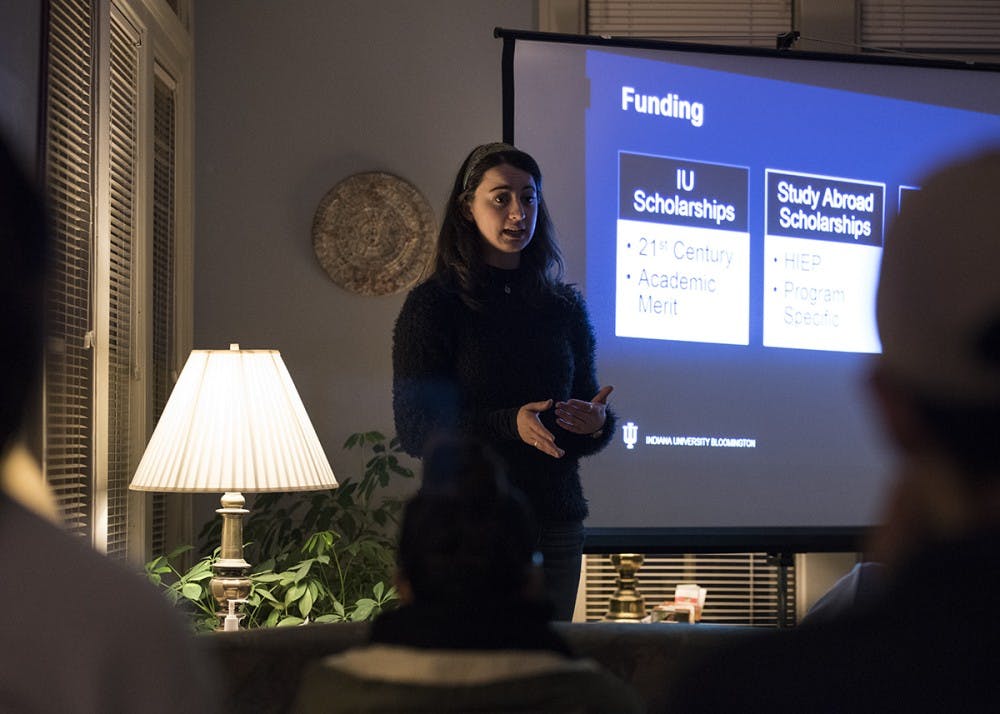According to the Office of Overseas Study, one in four graduating seniors studied abroad while at IU. With more than 380 overseas studies programs in over 50 different countries, navigating the study abroad process can be overwhelming.
La Casa Latino Cultural Center partnered with the IU Office of Overseas Study and the Office of the Vice President for Diversity, Equity and Multicultural Affairs (OVPDEMA) Overseas Studies and Scholarships Program to simplify the process for students looking to study abroad.
What are the advantages to studying abroad?
Senior Halley Rose Meslin, who traveled to Copenhagen, Denmark, said it’s all about befriending the locals.
“The whole point is to meet people,” she said.
Because of this, Meslin said she interacted with a "visiting" host family. Although she lived in a Danish residence hall with Danish and American students, she would spend weekends with her host mom, immersing herself in local activities.
In addition, students can also receive several credit hours toward their majors or minors, just as if they were still on campus.
What if I don’t have the money to study abroad?
Students can pay for their trip through a variety of scholarships.
There are 10 study abroad offices on campus, including the IU Office of Overseas Study and specific offices depending on what school the student studies in, such as School of Public and Environmental Affairs or the Kelley School of Business. All of these offices can assist with finding scholarships for students, Ochmaa Escue from the OVPDEMA Overseas Studies and Scholarships Program said.
These scholarships range from academic merit-based, to minority-based, to need-based and more. In the end, studying abroad for a semester can actually be less expensive than what a student would pay for out-of-state or in-state tuition, Escue said.
What else can I do once I’m in a new country?
“It’s all about balancing the urge to be a local with the urge to be a tourist,” Meslin said.
During her time in Copenhagen, she made sure to interact with her host family and talked to local high school students to learn what living in Denmark is like. She also volunteered at a local urban rooftop garden, but made sure to leave time to explore the city.
“You can’t go to a place that beautiful and not be a little touristy,” she said.
What if I’m nervous about studying in a different country?
Talk to someone who has already studied abroad to relax, Escue said.
“They will have the answers to your questions because they probably had the same questions themselves,” she said.
IU has a website with a list of contacts of student ambassadors who are study abroad returnees, in which students can reach out and talk to them about their experiences. In addition, there is a study abroad fair Nov. 6 where there will be several student resources.
What if I fall behind with my schooling?
It is imperative to make sure the courses you’ll be taking abroad will contribute to your major or minor, Escue said. This is not typically a problem with the multitude of study abroad programs offered to students. If students are still worried about falling behind, Escue said to consider a shorter program, instead of one that lasts a full semester.
Important things to do:
- Be open. “Some students say that a truly good study abroad program can take up to a year,” Escue said. In addition to being open to the time spent away from campus, she also said that students should be willing to travel somewhere that they may have never considered before.
- Do some soul searching. Meslin said, “Before you sign up for anything, you have to ask yourself, ‘Why do I want to study abroad here?’” This is also important because often students will be asked to write essays along with their applications on why they want to study abroad.
- Don’t forget the passport. Students who need to obtain a new passport can visit the Passport Acceptance Facility in the Poplars Building for help. The fees for passport photos and applications can be charged directly to the student’s bursar bill, if necessary.
A previous version of the article misspelled Halley Meslin's first name as Hallie and also said Meslin lived with a host family instead of in a residence hall. The IDS regrets these errors.




